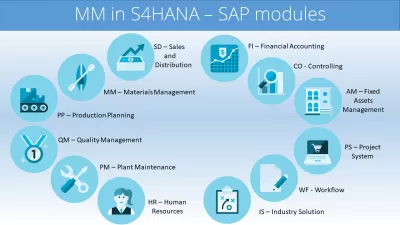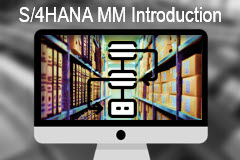How To Learn SAP Materials Management?
- SAP MM: Materials Management
- What is SAP Materials Management (SAP MM)?
- SAP MM submodules
- SAP MM Business Benefits
- Organization of logistics processes at the enterprise
- Material requirements planning
- Create Purchase Orders
- Organization of procurement processes
- Control of receipts and movements of objects in the warehouse
- Issue of materials
- Invoice control and inventory valuation
- Carrying out inventory and revaluation
- Register for the Introduction to S/4HANA Materials Management Course by Michael Management
- The purpose of this course:
- Frequently Asked Questions
SAP MM: Materials Management
In any enterprise there is a need for inventory management, as well as timely logistics. When performing various business operations, it is necessary to take into account many factors, which requires significant time and financial costs. To reduce costs and optimize the work of logistics managers, the Materials Management (MM) module from SAP is called upon.
How to gain knowledge in the field of SAP materials management? Of course, you can search for information yourself, study this issue in books, but it is much easier to study already prepared, structured knowledge. After completing the course, you will fully master the necessary skills for managing SAP materials.
It is Michael Management's S/4HANA Materials Management Introduction courses that are complete, informative and practical. But first things first.
What is SAP Materials Management (SAP MM)?
Materials Management is a module in the SAP ERP Central Component that provides companies with the necessary capabilities.
The main goal of SAP MM is to ensure that materials are always stored in the proper quantities and without shortages or gaps in the organization's supply chain. It also helps supply chain professionals and other SAP users complete product purchases on time and at minimal cost and be able to cope with day-to-day changes in these processes. One of the critical modules of SAP MM, it is part of the SAP ECC logistics function and plays a vital role in the manufacturer's supply chain. It integrates with other ECC components such as production planning (PP), sales (SD), plant maintenance (PM), quality management (QM), finance and controlling (FICO), and human capital management (HCM).
The use of SAP MM will help to effectively manage the business activities of the company, thanks to the following features:
- accounting of volumes and cost of warehouse stocks;
- control of the logistics system;
- reduction of costs for the purchase of materials and maintenance of the warehouse complex;
- organization of coordinated work of employees from different departments;
- increase in inventory turnover.
SAP MM submodules
SAP MM features include material management, purchasing process management, master data management (material and vendor master data), inventory management, material requirements planning, and invoice verification. All of these MM sub-modules have functions that perform specific business processes for these modules. They are executed through transactions, the method that SAP ECC uses to complete business processes. MM also supports other logistics functions that require material information, such as plant maintenance and project management.
SAP MM Business Benefits
Everything in MM revolves around master data, which is stored and processed in centralized master data tables. Master data types include material master, work center, bill of materials, and routing. Master data is used to create transactional data in SAP ECC. For example, when a production order is created in PP, it uses master data from MM for the raw materials needed to produce the finished product, which will later be used to create a sales order in SD.
How to create a material in SAP?Organization of logistics processes at the enterprise
The Materials Management module supports the full cycle of operations in operational logistics: planning the procurement of required materials, certification of suppliers, processing of works and services, inventory management of the enterprise and reporting.
Basics Of Logistics: Get Supply Chain Basic Skills!The SAP MM module will help you effectively manage material flows, thanks to the following functionality:
Material requirements planning
Using the module, you can control the amount of available stocks, as well as automatically create order proposals for purchase and production.
SAP Define an MRP Controller (Material Requirements Planning)Create Purchase Orders
The order contains information about the object of purchase, the terms of the price of the item, the date and terms of delivery. A purchase order can be created automatically or manually.
ME21N create purchase order in SAPOrganization of procurement processes
Materials Management will help you select suppliers of materials and services, control the status of orders and track payments. The module has a reminder system that notifies partners of open items for purchase orders.
Modern Procurement Process Guide: Concepts and StepsControl of receipts and movements of objects in the warehouse
When you create a receipt document, a material document and an accounting document are automatically generated that contain information about the postings made in accounting. The module reflects the internal movements of objects between the warehouses of the enterprise and posting the transfer.
Issue of materials
Goods issue reservations are created for various account assignment objects, which take stock availability into account. Reservations can be generated automatically or manually.
Invoice control and inventory valuation
When creating invoices, an accounting document is automatically created that contains data on the transactions made in accounting, which allows you to control the correctness of the calculations. Running an inventory valuation provides a link between material management and Financial Accounting by updating the main accounts of Financial Accounting when warehouse operations are performed.
Carrying out inventory and revaluation
The MM module supports several types of inventory: continuous, periodic, selective, and on a specific date. Revaluation allows you to change the value of inventory without changing the quantity.
Register for the Introduction to S/4HANA Materials Management Course by Michael Management
In this course, you will learn the SAP S/4HANA processes that underpin purchasing in SAP MM - Materials Management and how they work in SAP. We will take a detailed look at the three main data sources for purchasing and see how to create them in both SAP GUI and SAP FIORI.
The purpose of this course:
- Understanding the need for material flow management in procurement processes
- Explain the different types of master data for procurement and purchasing.
- Use SAP Master Transactions/FIORI Apps to Create Master Data
- Creation of data for business partners and material master record in GUI and FIORI
- Create Purchasing Information Records in GUI and FIORI
This course is required for Consultants, Developers, End Users, Executives and Managers, IT/Business Analysts, Project Managers, Project Team Members, System Administrators
Start learning SAP right now and you will be able to understand the need for material flow management in procurement processes, their features and work algorithm.
After studying the course, you will be able to become a full-fledged and high-quality SAP specialist.When the course is completed, you will have a formal final exam, and upon successful completion of this course, you will receive the S/4HANA Materials Management Introduction certification.
Good luck to you!
Frequently Asked Questions
- What are the fundamental concepts beginners should focus on in SAP Materials Management?
- Beginners learning SAP Materials Management should focus on understanding inventory management, procurement processes, material valuation, invoice verification, and the integration of MM with other SAP modules.

